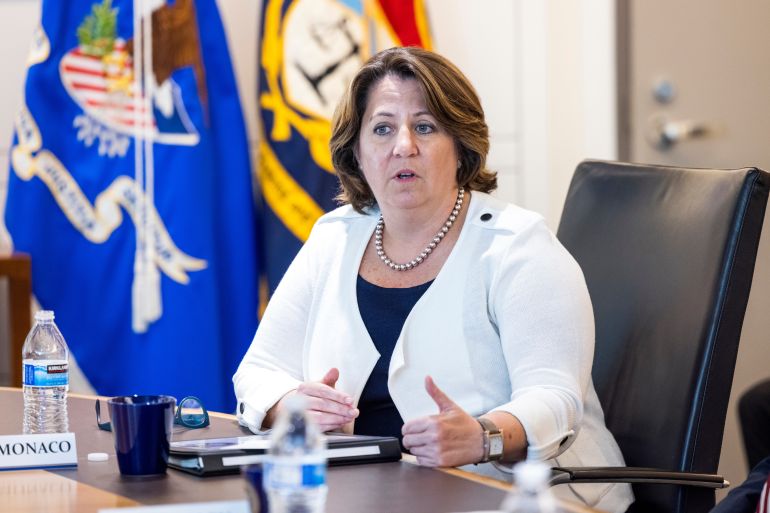US Justice Dept toughens policies towards white-collar crime
FBI agents to be assigned to corporate misconduct, prosecutors urged to be bold in holding companies accountable.

A top United States Department of Justice official detailed a series of policy changes aimed at rooting out corporate misconduct and prioritising individual prosecutions, signalling a shift to a tougher tone by the Biden administration on white-collar crime.
Speaking at an industry conference on Thursday, Deputy Attorney General Lisa Monaco said the Department of Justice would restore guidance that companies will need to provide full lists of people involved in any misconduct in order to receive any credit for cooperation from prosecutors.
Keep reading
list of 4 itemsSouth Sudan’s political elite ‘plundering’ public coffers
French prosecutor opens probe into Pegasus spyware allegations
Michael Avenatti sentenced to 2 1/2 years in prison for extortion
Department of Justice leaders “will urge prosecutors to be bold in holding accountable those who commit criminal conduct”, Monaco said in prepared remarks to the American Bar Association’s annual conference on white-collar crime.
Monaco’s remarks indicated a shift in the top US law enforcement agency’s approach toward white-collar crime under President Joe Biden. Under Biden’s predecessor Donald Trump, a Republican, the US government had sought to boost cooperation and was seen to be more lenient towards corporate crime.
US prosecutors in New York have brought tax fraud charges against the former president’s real estate development company, the Trump Organization, and its Chief Financial Officer Allen Weisselberg; both have pleaded not guilty.
In San Jose, California, the US is prosecuting former bio-tech start-up Theranos founder Elizabeth Holmes for fraud, seeking jail time and a $3m fine.
The department will require prosecutors to consider a company’s full criminal, civil and regulatory record when considering how to resolve an investigation into wrongdoing, Monaco said. Previously, the department focused primarily on similar types of misconduct when weighing a settlement.
Monaco said the department has begun to review data on corporate resolutions to understand better when not to use certain types of settlements in which it agrees not to prosecute a company in exchange for a fine and promises of better behaviour.
The department will back away from a prior shift away from corporate monitors – a costly aspect of many resolutions between prosecutors and companies, Monaco said.
It will look at ways to “surge resources” to corporate misconduct issues, including a new squad of FBI agents who will be embedded within the department’s Criminal Fraud section that is tasked with pursuing economic crimes, Monaco added.
Department of Justice officials had previously telegraphed the policy shift.
John Carlin, acting deputy attorney general and one of the department’s top officials, told an audience of white-collar defence lawyers in New York earlier this month that Justice would be devoting more resources to prosecuting corporate wrongdoing, the Wall Street Journal reported.